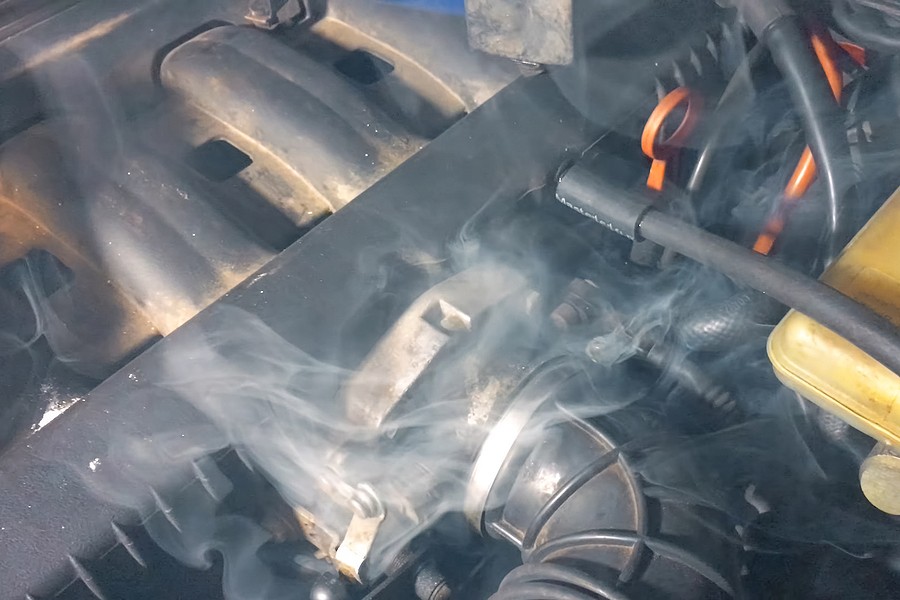Burning oil in a car can be a serious problem that needs to be addressed as soon as possible. If left unchecked, it can lead to engine damage and costly repairs. In this article, we will discuss what causes a car to burn oil and what steps you should take when you notice that your car is burning oil.
What Causes a Car to Burn Oil?
There are several reasons why a car might start burning oil. Some common causes include:
- Worn out engine parts: As a car ages, its engine parts may become worn out or damaged. This can lead to oil leaks, which can result in the engine burning oil.
- Incorrect oil level: If the oil level in your car is too low, it can cause the engine to burn oil. This is because the oil is not able to lubricate the engine properly, leading to increased wear and tear on the engine parts.
- Oil that is past its shelf life: Over time, oil can break down and become less effective at lubricating the engine. If you are using old oil in your car, it may not be able to provide the necessary lubrication, resulting in the engine burning oil.
- Faulty oil pump: The oil pump is responsible for circulating oil throughout the engine. If the oil pump is not working properly, it may not be able to deliver enough oil to the engine, leading to oil consumption.
- Bad gasket or seal: A faulty gasket or seal can cause oil to leak from the engine, leading to oil consumption.
What to Do When Your Car is Burning Oil
If you notice that your car is burning oil, there are a few steps you should take to address the problem:
- Check the oil level: The first thing you should do is check the oil level in your car. If the oil level is low, add more oil to bring it back to the proper level.
- Check for oil leaks: If you notice that the oil level is low, check for oil leaks. Look for oil stains on the ground where you park your car, and inspect the oil pan and oil filter for any signs of damage.
- Check the oil quality: If the oil level is fine and you are not experiencing any oil leaks, it may be an issue with the quality of the oil. Check the expiration date of the oil and consider replacing it if it is past its shelf life.
- Have the engine inspected: If you are unable to identify the cause of the oil consumption, it may be necessary to have a mechanic inspect the engine. They can determine the root cause of the problem and recommend the appropriate repair.
- Fix the problem: Once the cause of the oil consumption has been identified, it is important to fix the problem as soon as possible. Neglecting to address the issue can lead to engine damage and costly repairs.
Preventing Oil Consumption
There are a few things you can do to prevent oil consumption in your car:
- Regular oil changes: One of the most effective ways to prevent oil consumption is to perform regular oil changes. This ensures that the oil in your car is fresh and able to lubricate the engine properly.
- Use high-quality oil: Using high-quality oil can help prevent oil consumption. Look for oil that meets the specifications recommended by the manufacturer of your car.
- Keep an eye on the oil level: Regularly checking the oil level in your car can help prevent oil consumption. If the oil level is too low, add more oil to bring it back to the proper level.
- Fix any oil leaks: If you notice any oil leaks, it is important to have them fixed as soon as possible. Oil leaks can lead to oil consumption, so addressing them promptly can help prevent further issues.
- Follow the manufacturer's recommendations: Follow the manufacturer's recommendations for oil type and oil change intervals. This can help prevent oil consumption and ensure that your car is running at its best.
Conclusion
Burning oil in a car can be a serious problem that needs to be addressed as soon as possible. If left unchecked, it can lead to engine damage and costly repairs. Some common causes of oil consumption include worn out engine parts, incorrect oil level, oil that is past its shelf life, a faulty oil pump, and a bad gasket or seal. If you notice that your car is burning oil, check the oil level, look for oil leaks, check the oil quality, and have the engine inspected. To prevent oil consumption, perform regular oil changes, use high-quality oil, keep an eye on the oil level, fix any oil leaks, and follow the manufacturer's recommendations. By taking these steps, you can ensure that your car is running smoothly and avoid costly repairs.



